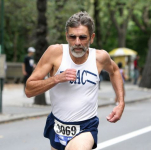How to Train to Run Fast for Decades

Key workouts and training strategies that helped Nick Willis run a sub-4 Mile 19 years in a row, Steve Spence sub-5 for 43 years and Harry Nolan sub-6 for 57 years.
By Amby Burfoot, PodiumRunner.com
There are fast Milers who break records, win gold medals and collect big prize money. Then there are Milers who stay fast for a really long time. This second group accumulates little but the admiration of their fellow runners. We applaud the mental and physical toughness they display in bucking the tyranny of time.
The trio of Nick Willis, Steve Spence and Harry Nolan belong to both groups, but primarily to the second, having run fast Mile races every year for multiple decades. Willis has run a sub-4 minute Mile for a record 19 years in a row (and counting). Spence achieved a sub-5 for 43 straight years and Nolan ran sub-6:00 for 57 consecutive years. All three are believed to be world best streaks in the Mile.
Nick Willis: 19 years sub-4
Willis’s latest sub-4 occurred just a few weeks ago when he ran a 3:58:63 on Jan. 19 in Clermont, Fla. Previously he shared the record with his countryman John Walker of New Zealand who also achieved 18 straight years sub-4 from 1973 through 1990.
In his long career, Willis, now 37, has raced to a personal record of 3:49:83, and collected Olympic 1500 meter medals in 2008 (silver) and 2016 (bronze). He currently lives in Ann Arbor, Mich., and works as an athlete experience manager for Tracksmith.
First sub-4 Mile: Feb 8th, 2003
Most recent sub-4: Jan. 19, 2021
Go-to workout for a fast Mile: In sharpening for the Mile, Willis likes a workout that begins with a 3 mile warmup and 2 miles at tempo pace. On a track, he then runs 6 x 300 at his current 800 pace with long 4-minute recoveries. The session finishes with a 600 at 800 pace. “With the long recoveries, this workout provides a good test of speed,” he says. “I also maintain leg speed by doing 10-second hill sprints year-around. ‘Use it or lose it’ is the motto I follow for speed."
How Willis builds speed-endurance: Willis does a warmup, 4 miles at tempo pace, and 6 x 600 meters with 90-second recoveries. He starts the 600s at 3K pace and finishes them at a little-faster-than-Mile pace. “This tells me I can handle the grind of the middle laps in the Mile, and finish with a good kick,” he says.
Weekly mileage and long runs: Willis doesn’t worry much about his total weekly mileage, but is a big believer in going longer than normal once a week. He also aims to log at least 55 minutes of continuous running on his recovery days. “I normally run anywhere from 60 to 90 miles a week,” he says. It all depends on time of year and upcoming races.
Cross-training: Willis believes in the benefits of gym work, but admits that he doesn’t do “as much as I probably should.” It seems he’s having too much fun snowboarding and skateboarding with his two sons. These activities have provided an unexpected boost to his fitness. “They keep my body exposed to lots of different stimuli and stress,” he notes. “As long as I don’t crash off my skateboard, it keeps me agile, nimble and better balanced. I think it has kept me more healthy for running.”
Maintaining motivation through the years: “I love running on trails, and with friends,” Willis says. “It’s not easy for me to share about real-life challenges when I’m sitting across from someone at a coffee shop, but my friends and I can open up to each other on a run.” He additionally credits his wife, coaches and physical therapists with being “more invested in my success than I am at times.”
His two sons (the oldest is 7) also motivate Willis, as he wants to “model” the importance of hard work and good sportsmanship to both. “I’ve been finishing at the back of races the last couple of years,” he observes. “I want them to see that you can still love something, and be proud of your performance even when you aren’t winning.”
Coming up next: “Hey, 20 straight years is so close,” Willis says. “It seems like it would be a crime not to try for a nice round number.” Still, it won’t come easy. There’s the Olympics this summer to gear up for — not to mention the uncertainty and anxiety surrounding COVID-19. And if the Olympics do happen, a post-Olympic lull is almost inevitable. “Injuries are an obvious potential obstacle,” Willis notes. “If I face any setbacks, will I be willing to claw my way back?”
For Spence and Nolan tips, continue reading at: podiumrunner.com
